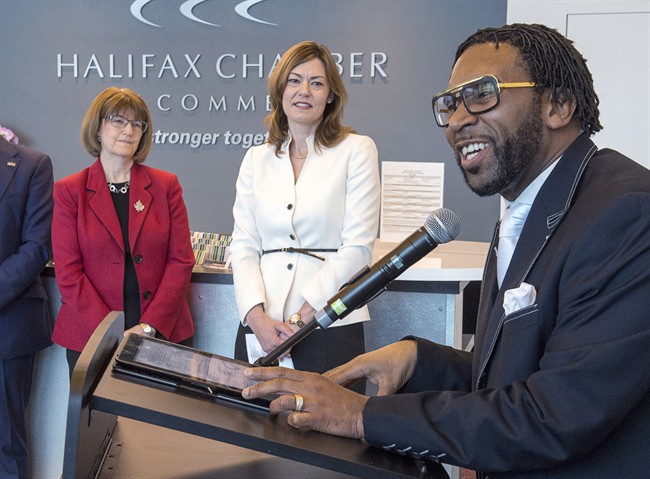The RCMP are further delaying a decision on whether to offer an apology to Halifax’s Black community for their use of street checks, as some Black Nova Scotian leaders say the force’s silence is damaging trust.

Rev. Lennett Anderson, the past moderator of the African United Baptist Association, disagrees with the Mounties’ view that they must await the completion of a national review of the practice.
Street checks, which are now banned in Nova Scotia, are defined as police randomly stop citizens, recording information and storing it electronically.
“It (the delay) wasn’t acceptable last year, nor is it acceptable now …. The silence is deafening,” Anderson said in an interview.
READ MORE: Halifax Regional Police ‘looking into’ body cameras after online petition hits 70,000
He was among the prominent Black citizens who participated in a provincially commissioned study of street checks released last year that found Black residents were five times more likely to be subjected to the practice than whites.
“It’s dehumanizing. It’s a traumatic thing,” Anderson said. “And they don’t need to wait for a national report to address the local damage.”
RCMP Cpl. Jennifer Clarke wrote in a recent email the force first needs to see a report on the topic being prepared by the Civilian Review and Complaints Commission.
“With the Nova Scotia RCMP being the provincial police and part of a national organization, our work extends beyond the municipality, and thus our considerations regarding an apology do as well,” she said.
The RCMP, which polices the suburbs of Halifax, was part of a study by Scot Wortley released in March 2019 that condemned the practice as targeting young Black men and creating a “disproportionate and negative” impact on the Black community.
Last October, retired jurist Michael MacDonald released a legal analysis concluding the practice contravenes basic constitutional and common-law rights.

Attorney General Mark Furey immediately announced a ban on street checks, and on Nov. 29, Halifax police Chief Dan Kinsella issued an apology before several hundred members of the Black community.
Meanwhile, in an interview last fall, RCMP Chief Supt. Janis Gray said the Nova Scotia division would await the Civilian Review and Complaints Commission study, which began in April 2018 and had been expected in March of this year.
However, the commission said last week it has delayed the release of that report until the fall. Clarke said in an email the force will await the report “and determine the way forward from there.”
She wrote the Mounties are “committed to strengthening the relationship between the RCMP and our African Nova Scotian communities.”
- Budget 2024 failed to spark ‘political reboot’ for Liberals, polling suggests
- Peel police chief met Sri Lankan officer a court says ‘participated’ in torture
- Wrong remains sent to ‘exhausted’ Canadian family after death on Cuba vacation
- Liberals having ‘very good’ budget talks with NDP, says Freeland
Anderson said the latest slowdown is harming the force’s relationship with the province’s Black communities. He noted a public apology must be followed up with concrete measures but said an apology “is a step in the right direction.”
Vanessa Fells, the program co-ordinator of the African Nova Scotia Decade for People of African Descent Coalition, said at a time of global discussion on police mistreatment of Black citizens, the silence of the RCMP has become a growing concern for her group.
“At some point they need to stop stalling and step up and take responsibility,” she said in an interview.
The province’s ban on street checks applies across Nova Scotia, however Wortley noted in his final report that more needed to be done to repair the mistrust built up over generations.
Particularly, he noted that it was important to set up a system to record data about police stops of all kinds – including traffic stops – by age, gender and race in order to identify patterns of unfair treatment.
He also called for periodic surveys of the general public about their experiences of contact with the police, and suggested these results be given to the public on a regular basis.
The RCMP didn’t provide an update on what items from the report been acted upon by its regional division.
READ MORE: Petition for Halifax police to adopt body-worn cameras shows demand for accountability
A spokesman for the Halifax police said police have made “good progress” on several items in the Wortley report since the public apology, but added that COVID-19 has slowed the pace in some areas.
Const. John MacLeod cited improvements in education and training of officers. He said police will “deliver” on Wortley’s recommendations on improving training of new recruits, which include screening “for both cultural competency and racial bias” and avoiding the infiltration of police by white supremacist groups.
Fells said that while she is still looking for the Wortley report to be fully implemented by the Halifax police, it appears the public apology has started a process of change and dialogue.
“I’ve heard from the chief (Kinsella) on his renewed commitment. We’ve heard nothing from the RCMP, nothing at all,” she said.
This report by The Canadian Press was first published June 16, 2020.



Comments